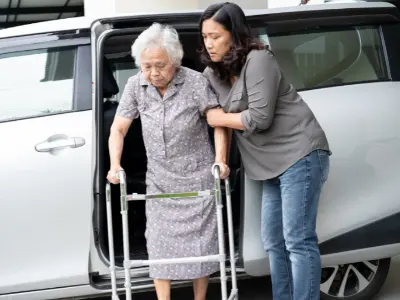

More than one in five adults in the United States — approximately 53 million Americans — are family caregivers for their loved ones. Being a caregiver is the ultimate expression of love and devotion, but it can also be incredibly stressful, demanding significant emotional, physical, and personal sacrifice.
Often caregivers are left exhausted, depleted, and feeling at the end of their ropes. If this sounds like you, I encourage you to pause, check in with your own mental and physical well-being, and know that support is available. Remember, caring for yourself is not a sign of weakness but a vital step to sustaining your ability to care for others. Reaching out for help isn’t a failure, but a necessary act of self-care that can make a meaningful difference in your journey as a caregiver.
Here are five critical signs that you, as a caregiver, may need help caring for your aging parents. Recognizing these signs early can make a significant difference in maintaining your own well-being and ensuring your loved ones receive the best possible care. Caregiving is a deeply rewarding but often challenging role, and it’s important to be aware of the warning signals that indicate you might be pushing yourself too hard. If any of these signs resonate with you, it may be time to seek support—whether through professional resources, community programs, or trusted friends and family. Being proactive about recognizing these signs can help you find the assistance you need before burnout takes hold, ensuring both you and your loved ones are cared for with compassion and attention.
1. Physical Toll
To provide effective and compassionate care for your loved one, you must also be healthy. Are you feeling extreme fatigue, insomnia, constant headaches, or even getting sick more often? Your body is being affected by stress and lack of rest - you need breaks and help from others to get back to your stronger self.
2. Burnout
Being a caregiver is a path to emotional exhaustion. The physical, mental, and emotional component is a lot for anyone. Check in with your levels of stress, anxiety, and irritability - and be honest with yourself about experiencing feelings of helplessness that may lead to detachment and even a loss of patience for your loved one.
3. Neglecting Work or Personal Responsibilities
One person can’t do it all. Often, your elderly loved one may need near-constant attention for physical assistance, mobility support, or emotional care if they are feeling scared, depressed, or anxious, and they may rely solely on you. However, when you start to experience difficulties managing your personal responsibilities—such as parenting your children or fulfilling your job duties—it’s a clear sign that you cannot do this alone. You may also begin to isolate yourself from friends and family, which can further impact your well-being. Build your team—build a village—to share the responsibilities, support each other, and ensure your loved ones receive the care they need. Avoiding isolation and seeking help is essential for your well-being and theirs.
4. Money Strain
According to the National Council on Aging (NCOA), over 1 in 10 older adults live below the poverty line, and many more struggle to afford basic necessities. As a caregiver, you may be supplementing your senior's care with not just time, but also your own money. In addition, care for them may mean fewer hours of work for you. Complete Elder Solutions can help with practical strategies for funding long-term care, including insurance options, personal savings, and assistance with emergency and long-term health care planning and coordination.
5. Increased Care Needs You Can’t Meet Alone
If your loved one’s health or cognitive ability has declined to the point that you cannot physically care for them, are unable to leave them alone, or lift, transfer, or manage their mobility safely, just know you are not alone. Recognizing the signs early can help you avoid burnout and ensure your parents get the right level of care. You too need to be seen and supported - and know that you can and must reach out for help when you need it.
About the Author:
Princella Seymour is the CEO and Founder of Complete Elder Solutions. With thirty years of experience, she is a leading expert in elder care, advocating for love, family, and dignity. A former Vice President of the National Association of Social Workers and part of the Aging Life Care Association, she is passionate about transforming elder care. Her book, Everything You Need to Know About Me, draws from her experiences helping families navigate the challenges of honoring their loved ones' wishes. Through her work, Princella and her team assist thousands, ensuring families never face aging alone and every individual is treated with dignity.






Comments
Post a Comment